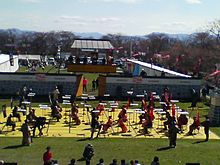
Tendo (天童 Tendō) is a city in Yamagata, Japan, known for exactly one thing: making pieces for shogi, also known as Japanese chess.
Understand
[edit]Local estimates claim that as many as 95% of the shogi pieces produced in Japan are made in Tendo. (Presumably, this was phrased to exclude any plastic sets that are made abroad.) Originally, only Yamagata wood was used in making shogi pieces. Today, wood imported from Cambodia, China, and Thailand fills the bulk of production, while native Japanese boxwood from Kagoshima and Mikurajima is reserved for the high-grade pieces.
Shogi is believed to have come to Japan in the Heian period, and it shares a common ancestor with Western chess. It also shares some pieces and strategies with chess, though pieces can be promoted to gain new movements, and captured pieces can be returned to play as turncoats against their original owner.
Tourist information site
[edit]The local tourist association has a Japanese-only guide site. with integrated Google Translate.
Get in
[edit]JR Tendo Station is on the Yamagata Shinkansen, about three hours from Tokyo and one stop north of Yamagata. It's also on the JR Ou Main Line between Fukushima and Aomori, about 20 minutes from Yamagata.
Get around
[edit]Everything is within walking distance of the station, either in the station building itself or down the main street, Kamatahoncho, east of the station. As you head down Kamatahoncho, keep an eye out for the tobacco shop with an homage to Magritte's "Ceci n'est pas une pipe" along the way, as well as a couple of giant shogi pieces to pose with.
See
[edit]
- 1 Tendo Shogi Museum (天童市将棋資料館), JR Tendo Station, first floor (east exit), ☏ +81 23-653-1690. Tu-Th 09:00-18:00. A compact but comprehensive museum about the history of shogi, with impressive displays on how pieces are made, some gorgeous sets, and reams of information on grandmasters through the years. Displays are only in Japanese, but the front desk can provide an excellent English booklet, and the exhibits are easy to follow. Next door is a small shogi parlor; if you arrive on a day the museum is closed, hang out in front looking disappointed, and someone may take pity and let you in. ¥300.
- 2 Hiroshige Museum of Art (広重美術館), 1-2-1 Kamatahoncho (a 10-minute walk east of JR Tendo Station), ☏ +81 23-654-6555. 08:30-18:00 April-Oct; 09:00-17:00 Nov-March. Closed for renewal from 2021. This museum has a small collection of prints and artifacts related to the ukiyo-e master, Hiroshige. It is not intended to cover his entire career, focusing mostly on lesser-known work that he did for the Tendo samurai clan. Descriptive materials are only in Japanese. Upstairs are a decent-sized library and another gallery for temporary (non-Hiroshige) exhibits. ¥600.
Do
[edit]
- Ningen Shogi (人間将棋), literally "human shogi", is held annually as part of Tendo's cherry blossom festival, on a Saturday and Sunday near the end of April on Mt. Maizuru. Warriors in full armor and kimono-clad maidens move between spaces at the command of their warlords/players, while the audience watches from the nearby hillside.
- There are onsen at the hotels east on Kamatahoncho.
Buy
[edit]Shogi pieces make nifty souvenirs. Expect to pay about ¥1000 for a single piece with the character stamped directly on the wood (oshi goma), depending on the size. These are handsome for display, even if they wouldn't suffice for tournament play. Pieces that were painted and lacquered (kaki goma) by machine begin at ¥2000; prices for hand-carved pieces escalate quickly, depending on the quality of the wood involved, to ¥80,000 and up for the highest-grade (moriage goma).
- 1 Eishundo (栄春堂), 1-3-28 Kamatahoncho (a 10-minute walk east of JR Tendo Station, across the street from the Hiroshige Museum), ☏ +81 23-653-2843. daily 08:00-17:00. There are a few shogi shops in town, but this one is easy to find and readily open to visitors. Don't expect much more than a grunt from the resident craftsman, but you can see bit of the process, and there are a few shelves of affordable shogi pieces and Tohoku's native kokeshi dolls for sale in the next room.
Eat
[edit]- Olive (オリーブ). Lunch 11:00–16:00, Dinner 18:00–22:00. An Italian pizza and pasta restaurant.
- Sultan (スルターン). An Indian restaurant.
Drink
[edit]Sleep
[edit]- 1 Comfort Hotel Tendo. A business hotel next to the station.
- There are a couple of hotels further east down Kamatahoncho with onsen.
- Takinoyu Hotel (滝の湯). Check-in: 15:00, check-out: 10:00. A popular hotel in the Tendo Onsen area with private onsen in the rooms and a public onsen open for staying guests and daytrippers.
Go next
[edit]- There's a museum dedicated to a shogi master in Kurashiki in Okayama prefecture.
For local options:
| Routes through Tendo |
| Shinjo ← Murayama ← | N |
→ Yamagata → Yonezawa |
| Shinjo ← Ashisawa ← | N |
→ Yamagata |
| END ← | N |
→ Yamagata → Kaminoyama |
| Shinjo ← Obanazawa ← | N |
→ Yamagata |
| Yamagata ← | S |
→ Higashine → Sendai |
